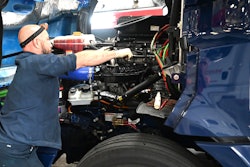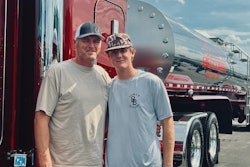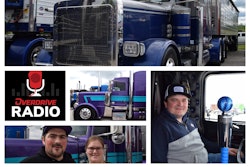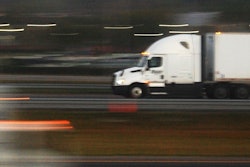Owner-operators bring a big dose of skepticism to the prospects for any truly driverless trucks on the road, according to hundreds of Overdrive readers who responded to survey questions last month. A 56% majority of survey respondents (highlighted below in the chart) were most concerned with the potential for disaster as a result of an accident or malign actors' remote manipulation.
Capturing a common theme, one reader questioned in commentary whether driverless rigs will ever be allowed beyond "very specific roadways." A small share of readers thought driverless trucks could work on dedicated infrastructure, or private roads away from passenger vehicles like those the Atlas Energy Kodiak Robotics-powered rigs are today running on in the oil field, hauling frac sand.
Upkeep for the electronics will no doubt be a challenge with extreme conditions over-the-road, the commenter added, noting it could be "close to impossible to keep up the needed maintenance required for these trucks to read the roadway, not to mention the emergent situations that are unexpected and unpredictable." With safety in mind, 13% of owner-operators favored requiring a human at the controls as a failsafe for any highly autonomous rig, another 7% urging the same simply to protect truckers' work.

"I foresee very limited use of this technology in the near term," the commenter added, then offering his best guess at how the public would respond to driverless trucks. "The first deadly accident, depending on severity, will dictate how, when and where the technology will be allowed and under what conditions."
Nearly a fourth of all owner-operator respondents to Overdrive polling echoed the sentiment, saying driverless rigs are just "one big accident away from being banned."
[Related: Automation tech's trucking role divides industry interests in Senate hearing]
Survey results come on the heels of autonomous trucking company Aurora Innovations' splash announcement May 1 of commercial driverless operations, viral critiques of the company's pitch to fleets, and subsequent reporting that revealed truly driverless operation remained quite a ways away from prime time among most tech developers.
The largest share of survey respondents (a full third, as shown above) viewed prospects as fundamentally too risky, to say the least, to get behind. One owner-operator commenter envisioned the nightmare scenario of remote takeover by malign actors turning "that AI truck into a weapon of mass destruction with the blink of an eye," he said.
The many variables within specialized freight left him skeptical about true competition from trucking companies released from the need to compensate a human operator. For all the loud talk of increased safety with autonomous operation, the cost savings for fleets long-term, without the need to pay a driver, has long been the quieter sales pitch from tech developers to trucking companies. Yet "is an AI truck going to check to make sure a load is secure going down the road with a flatbed?" the commenter noted. "Everybody knows that things can come loose. ... Can an AI truck be ready to control the surge of liquid in a half-full tanker if it has to stop abruptly for some reason? Do we really trust AI trucks in the mountains on steep grades heavy as hell with a load in inclement weather conditions?"
"So they want to replace the most complex computer system [the human mind] with a much more primitive one? Sounds like another bad idea from the good-idea fairy. Only a well-trained, experienced human can operate a truck at maximum safety."
--One among dozens of commenting Overdrive survey respondents
The owner addressed his "trucking family" writ large, finally. "Everything does not need to be run by machines," he said. "There is nothing wrong with the good old human spirit."
Even with widespread skepticism, asked to assess a timeline for real competition from driverless fleets, more owner-operators than not felt the competitive reality was well on its way.
[Related: When will owner-operators have to compete with truly 'driverless' fleets?]
Jim Edwards, who's long worked with the National Association of Small Trucking Companies to press issues in Washington., D.C., in essence agreed with the 23% of owner-operators who declined to give a distinct timeline for any fundamentally changed competitive landscape in freight hauling.
Edwards wasn't putting his head in the proverbial sand about the speed of technology development -- "my sense is that it may come more quickly than many people think," he said about driver-out Level 5 autonomous capabilities at scale. Yet he echoed common sentiment expressed by NASTC President David Owen that "even in autonomous vehicles there will be a need for a live human being. That's the viewpoint that the roboticized truck is a tool, not an independent entity that can control itself totally."
Segregated haul routes for such vehicles, certainly requiring big infrastructure investment, "might mitigate the risk" involved, he said. Yet looking at the landscape as it now stands, "you can't have something on the street that's still not quite there. One little malfunction won't cut it."
Edwards and some Overdrive survey respondents drew parallels with commercial pilots, where manual operation during takeoff and landing remains a necessity. It's not exact, he said, but "there's a parallel, really, to the first-mile and last-mile" for highway freight.
"These trucks will never make it past linehaul operation," said one among survey respondents, echoing Edwards.
That doesn't mean technology developers won't keep trying, as long as investment capital keeps moving into them and/or they reach that holy grail of a venture-funded firm: profitability.
One commenter pointed out that it took about a decade for Amazon to get to that point back in its early days, and today the company is a monolith in retail. With federal initiatives to incentivize innovation in automated transportation and AI in its various forms ramping up, might the gospel of automated-vehicle safety lead to further incentives for automated fleets? the commenter asked. That would put pressure on small businesses to adopt costly equipment, potentially eliminating "anyone who can't afford the extreme high cost to adapt to this tech."
Growth, cut rates, consolidation. Then automated fleets "are the only option," as the commenter unwound a doomsday scenario for small business. "Then they would simply raise rates and do what Wall Street wants: maximum profit. ... Mega carriers might have a chance. They have a little money to adapt somewhat, but more importantly they have the knowledge of running a large fleet with a driver they can throw in that equipment for now. What happens if someone like TQL just adds their own AV equipment to deliver? What would the load board look like then?"
[Related: Aurora says it's hauling driverless for Uber Freight, Hirschbach]
More voices among owner-operator commenters offered a variety of views:
"As long as they have a clear plan and a correct, complete and well-understood and -deployed action plan and programming, I don't see this as an issue. At this stage, I can't see it impacting the small fleets and owner-operators due to the cost of the process. I do believe that qualified drivers need to be in the truck and well-trained. I feel like short trips at this time that always go to the same places are an ideal way to work out bugs to prepare for longer and more complicated routes. It is inevitable, they are here, and we need to accept it and move forward with caution."
"The human brain is the most complex and powerful computer ever created. It can operate a truck, safely, without pavement markings, in blinding snow, rain, and adverse conditions. Its cameras, our eyes, are more complex and adaptive than any camera available."
"We already have 'driverless' transport. Its called rail transport. If we continue to remove jobs that people do no one will be able to afford the items being transported. Progress, safety, production and profitability are all important but not at the expense of jobs. A healthy economy is based on lots of people working, earning a good living and spending those earnings to grow the economy, which creates jobs. AI and automation only works to concentrate wealth. It's not conducive to a sustainable, healthy economy. Amazon has left a trail of destruction to local economies in its wake. Companies close every day because of automation, and jobs are lost. Driverless trucks most likely could be proven to be safe, but would concentrate a very diverse industry. It would once again concentrate wealth, and lose jobs."
"This technology could be fairly implemented, where a CMV driver could allow driverless technology to take control of the vehicle in an emergency situation to avoid a collision and other safety hazards."
"Truck drivers need experience to get to be good, and better, at the job. We learn and experience something new or slightly different every day. I can see an integrated set-up to allow solo drivers to compete with teams as a subscription service. However, I think the legislature in (can't believe this) California has one thing right. They've pushed twice to stop full automation for vehicles over 10,000 lbs. Both times vetoed by Gov. Gavin Newsom. My ideal supplemental system would let me program a route, a truck stop or truck parking destination, sticking to interstate highways, and have a programmable speed limiter for automation, and automation on certain stretches of road."
"With better infrastructure in this country, we may be able to get to the point of autonomous trucks. But I doubt this country will invest in a massive project like that."
[Related: Contractor classification bill could open back door for more techs required in carrier leases: OOIDA]











